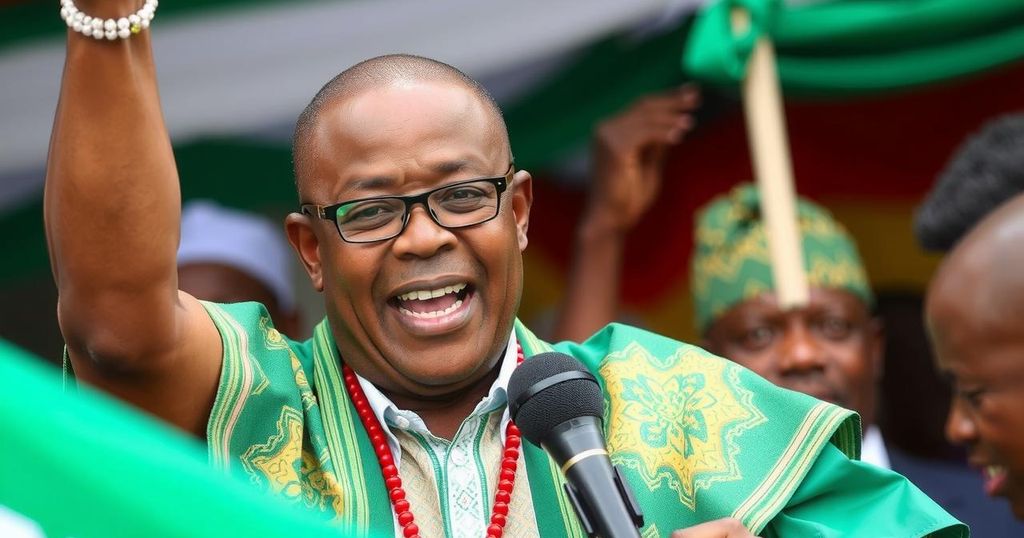Former president John Drahami Mahama won a significant comeback election in Ghana, defeating Vice President Mahamudu Bawumia of the ruling NPP amidst economic dissatisfaction. Mahama’s victory, confirmed by preliminary results, reestablishes the NDC in power, ending the NPP’s eight-year rule. High inflation and public frustration over economic conditions dominated the electoral discourse, leading to a decisive call for change from the voters.
Ghana’s former president, John Drahami Mahama, achieved a significant electoral victory in the recent elections, marking a historic comeback after the ruling New Patriotic Party (NPP) conceded defeat. Vice President Mahamudu Bawumia, the NPP’s candidate, acknowledged the electorate’s desire for change, particularly in light of the government’s management of the economy, which has faced severe challenges. This win concludes the NPP’s eight-year tenure under President Nana Akufo-Addo, whose administration struggled against high inflation and a national debt crisis.
In a statement following the election, Bawumia confirmed Mahama’s victory with a reported 56.3% of the vote, compared to 41.3% for himself. Mahama, who served as president from 2012 to 2017 and has now reclaimed his position after unsuccessful attempts in the 2016 and 2020 elections, has ignited celebrations among his supporters in Accra. The National Democratic Congress (NDC), led by Mahama, also captured a majority in parliament during these elections.
The economic difficulties faced by Ghana were a central theme of the campaign, with the country experiencing a period of default and currency depreciation, necessitating a $3 billion rescue package from the International Monetary Fund (IMF). Mahama’s return to power was seen as a response to widespread dissatisfaction with the current administration’s economic performance. Despite a slight decrease in inflation and improving macroeconomic indicators, many citizens expressed discontent over their cost of living.
The electoral results have not yet been officially announced, but the swift concession from Bawumia reflects the urgent call for change within the Ghanaian populace. Mahama’s acknowledgment of Bawumia’s congratulatory message on social media emphasizes the importance of this electoral moment. Observers, including the US Embassy in Accra, have praised the election as a reflection of the democratic will of the Ghanaian people, signaling strong bilateral relations ahead.
This election illustrates the dynamic nature of Ghana’s political landscape, where economic concerns significantly influence voter decisions. Furthermore, it highlights the ongoing interplay between the two major political parties, the NPP and the NDC, within a historically stable democracy. Going forward, Mahama’s administration will be closely scrutinized as it addresses the economic challenges that contributed to the NPP’s electoral downfall.
The political context of Ghana’s recent elections is characterized by economic turbulence that has severely affected public sentiment. The NPP had been in power for eight years and its governing period was marred by soaring inflation and a reneged economic promise, leading to widespread feelings of frustration among citizens. Mahama’s previous term was also challenging, marked by significant energy issues and fiscal difficulties, establishing a competitive backdrop for his current candidacy. With a history of oscillating power between the NPP and NDC since the country’s return to democratic politics in 1992, this recent election underscores a pivotal moment in Ghanaian politics, driven primarily by economic factors affecting everyday lives.
The electoral triumph of John Drahami Mahama symbolizes a decisive shift in Ghanaian politics, borne from public dissatisfaction with the ruling party’s economic management. The expedited admission of defeat by the NPP highlights the dramatic impact of economic issues on electoral outcomes. The response from the electorate indicates a clear demand for new leadership capable of addressing pressing economic challenges following a trying period. As Mahama resumes the presidency, the focus will now shift toward fulfilling the hopes and expectations of the Ghanaian people, who have called for substantial change.
Original Source: www.bryantimes.com






